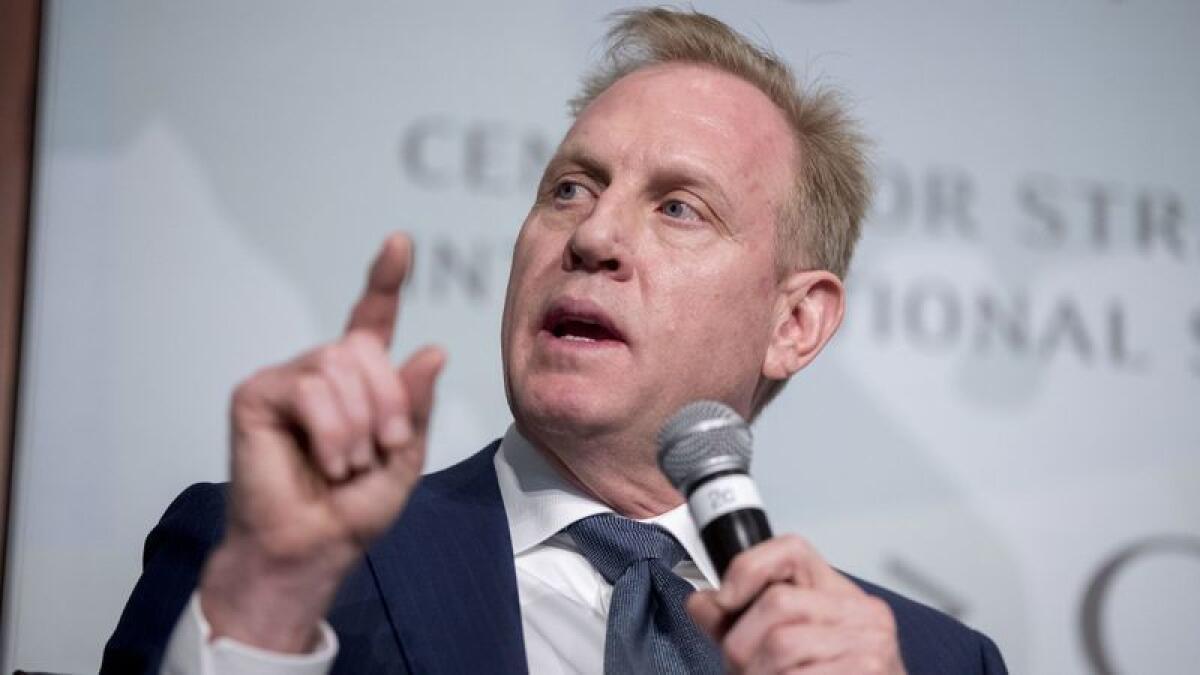Trump will nominate Patrick Shanahan for secretary of Defense, White House says

- Share via
Reporting from Washington — President Trump will nominate Patrick Shanahan to be secretary of Defense, choosing a former aerospace executive who has run the Pentagon in an acting capacity since Jan. 1, the White House said Thursday.
Sarah Huckabee Sanders, the White House press secretary, announced the nomination on Twitter, saying that Shanahan “has proven over the last several months that he is beyond qualified to lead the Department of Defense, and he will continue to do an excellent job.”
For the record:
5:35 p.m. May 9, 2019A previous version of this article said that Patrick Shanahan has been acting secretary of Defense since December. He has held that position since Jan. 1.
Shanahan has been more supportive of Trump’s priorities than James N. Mattis, who resigned as Pentagon chief late last year, telling Trump he needed someone “whose views are better aligned with yours.”
Shanahan has little experience with the military or as a strategic thinker on national security affairs, which could prove a hurdle in winning Senate confirmation.
If confirmed, he would be the first Defense secretary since Robert McNamara, who headed the Pentagon more than five decades ago, who came out of the business world, had not served in Congress and had little experience in government.
Unlike McNamara, who was secretary of Defense from 1961 to 1968 under Presidents Kennedy and Johnson, Shanahan never served in the military.
If confirmed he would continue to oversee the federal government’s largest department at a time when U.S. forces are heavily engaged, both overseas and along the U.S.-Mexican border. Many of Trump’s top national security goals in Afghanistan, Syria, Venezuela and North Korea remain unachieved.
Trump has repeatedly praised Shanahan’s tenure as acting Pentagon chief, widely viewed as an audition. But the president delayed the nomination while he considered other candidates with more government experience.
In a statement, Shanahan said that if he is confirmed, he will “continue the aggressive implementation” of the administration’s defense strategy. “I remain committed to modernizing the force so our remarkable soldiers, sailors, airmen, and Marines have everything they need to keep our military lethal and our country safe,” he added.
The five-month delay in picking Mattis’ successor appeared to reflect Trump’s fondness for a Cabinet filled, in part, with acting secretaries who might be more beholden to him than after winning confirmation.
Shanahan, a mechanical engineer who joined the administration as the Pentagon’s deputy secretary, spent more than 30 years at Boeing Co., where he led programs for commercial planes and Pentagon-funded missile defense systems.
Democrats are likely to scrutinize his sparse resume during confirmation hearings. Key Republicans said Thursday they were pleased Trump had finally decided to nominate Shanahan and fill the Pentagon job.
“We need a confirmed leader at the department and, after working with him closely over the last few months, I welcome his selection,” Sen. James M. Inhofe (R-Okla.), chairman of the Armed Services Committee, said in a statement.
After a Senate hearing in February, Inhofe told reporters that Shanahan lacked “humility” and that his months as acting secretary were “a pretty good indication that he’s not going to be nominated” as secretary.
Sen. Lindsey Graham (R-S.C.) called Shanahan “a logical choice” and said he expected to support the nomination.
“I hope and expect that he will advocate for defense policies that lead from the front, not from behind,” Graham said. “I also hope and expect he will make it clear to America’s adversaries that we mean what we say, and that our allies see us as a reliable partner.”
Graham had clashed with Shanahan over Trump’s decision to withdraw all U.S. troops from Syria until the White House backed down and agreed to keep a few hundred troops there indefinitely.
Although Shanahan’s views on many strategic issues are little known, he has called for the Pentagon to shift from fighting insurgent wars — the focus during the post-9/11 period — to preparing for and deterring conflict with China and other powers.
His focus was “China, China, China,” he told senior Pentagon officials in December.
Shanahan won Trump over by his willingness to back White House priorities, a sharp contrast with Mattis, who often slow-rolled Trump’s pronouncements and tweets when it came to transgender soldiers, the NATO military alliance, a withdrawal from Syria and deployments along the border.
Shanahan has led the administration’s proposals to develop a separate military service for fighting in space, impressing Trump.
By backing Trump’s declaration of a national emergency along the border, Shanahan freed as much as $3.6 billion in funds appropriated by Congress for military construction and drug interdiction programs. The money is now available for construction or repairs of the border wall.
Shanahan has few qualms about using Pentagon funds along the border, telling his aides that he is intent on supporting Trump’s agenda.
But he also has moved slowly in shifting military construction funds to the wall, not wanting to anger lawmakers from both parties who oppose the move and could oppose his nomination.
His nomination has also been delayed while the Pentagon inspector general reviewed allegations that he violated an ethics agreement requiring him to recuse himself from decisions involving Boeing.
The inspector general’s office cleared Shanahan of those allegations in March, although it did find he “routinely” mentioned Boeing in meetings with other Pentagon officials.
More stories from David S. Cloud »
More to Read
Get the L.A. Times Politics newsletter
Deeply reported insights into legislation, politics and policy from Sacramento, Washington and beyond. In your inbox twice per week.
You may occasionally receive promotional content from the Los Angeles Times.











